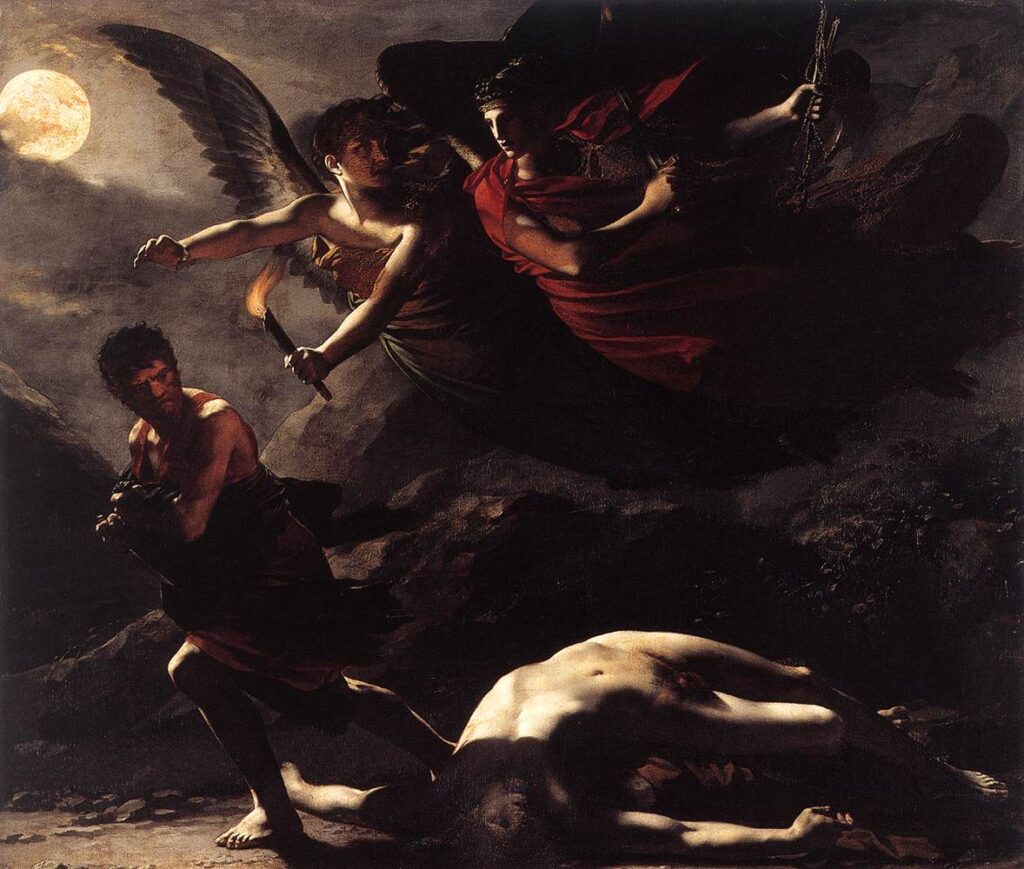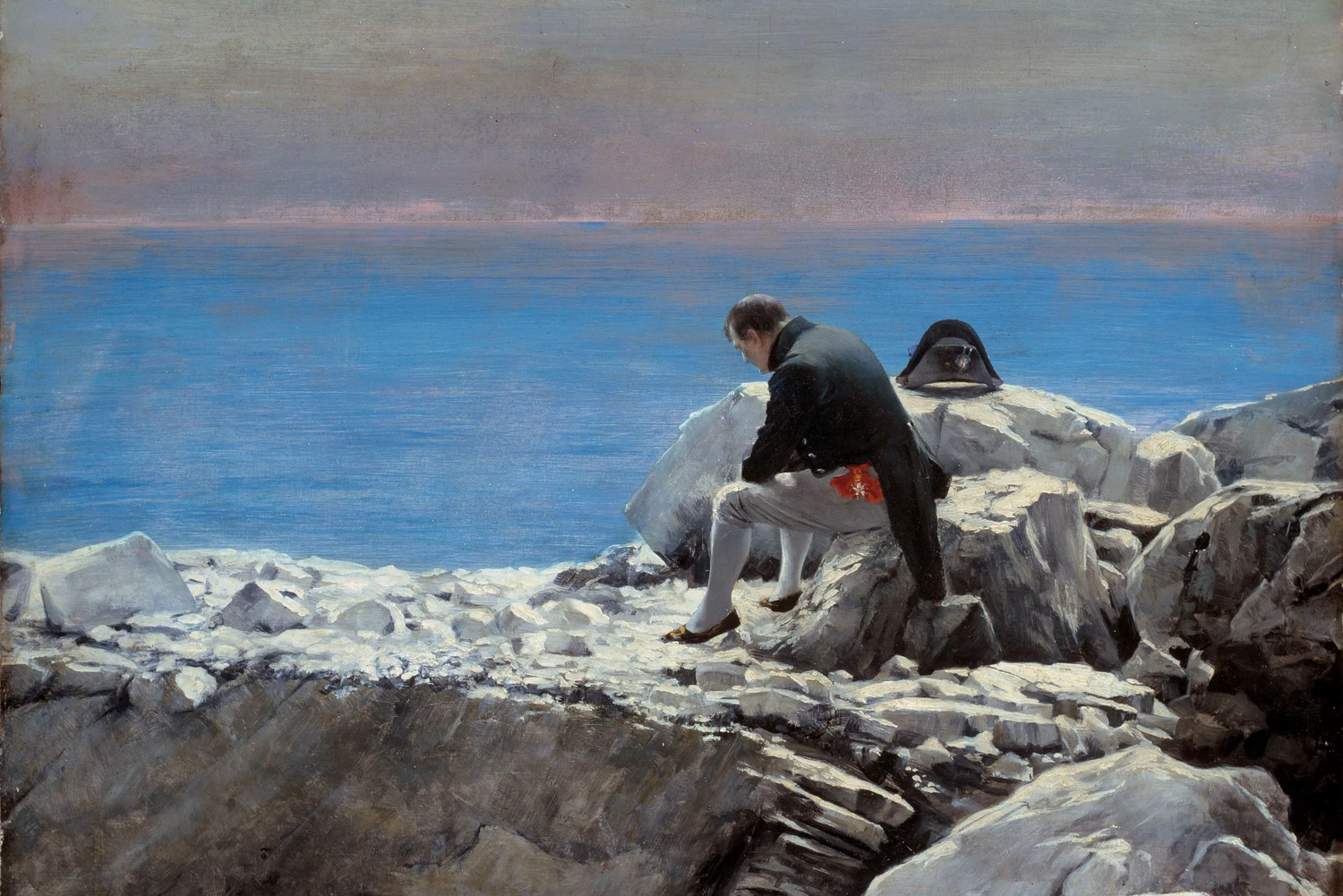Napoleon Bonaparte was born under a diurnal sect, with the Sun above the horizon as the dominant luminary of his chart. This marks him as aligned with the solar, outward-facing, authoritative current of fate: those destined to enact their spirit through visible force, public function, and sovereign will. But it is precisely this solar path that finds its crucifixion in the sign of Cancer, the nocturnal seat of memory, lineage, and the primordial Mother.
His death, on the 5th of May 1821, is not merely the biographical end of an exiled man, but the symbolic consummation of a spiritual mission sealed within the sign of the Mother. When one observes his natal chart through the lens of Hellenistic astrology, with particular attention to the Hermetic Lots, it becomes clear that the Emperor’s fall was not solely a political or military consequence, but a cosmic operation, a primordial judgement staged within the womb of the Zodiac. Napoleon died under the simultaneous releasing of two destinies: the Lot of Spirit and the Lot of Fortune, both in their major periods (L1) under the sign of Cancer, precisely where Saturn, the planet of structure, time, and punishment, finds its fall. In this configuration, we encounter the full arc of his demise: a forced return to origin, to the house of the Moon, the Mother, to the collective memory that engulfs all.
Cancer becomes both stage and tomb, the sign where the daimon dissolves and Fortune gathers the ruin of the flesh. In analysing the placements of the Lots of Necessity and Nemesis in the same ninth house, alongside Venus and Saturn, it becomes evident that his empire, far from being a mere political project, was a Herculean but deeply doomed attempt to inscribe personal destiny upon the tablets of universal history. This reading proposes not a biography, but a spiritual necropsy of a man possessed by a Lot.
I – The Ninth House as Empire: Faith, Judgement, and Mission
In Hellenistic astrology, the ninth house is the domain of faith, higher justice, and visions that transcend the immediate condition of the flesh. Theology is written there, as is the hybris of those who dare to touch the heavens with hands stained by soil. In Napoleon’s chart, this house is burdened by a heavy alignment: Saturn, Venus, Necessity, and Nemesis, a configuration that surpasses any notion of easy fortune or divine favour. Saturn finds himself in Cancer, the sign of his fall, signalling a structural tension between the urge to establish a new order and the impossibility of doing so without re-encountering the Maternal womb.
Venus, meanwhile, is not the goddess of pleasure, but of the idealised homeland, of love for lineage, of the desire to be recognised as heir to civilisation. Necessity, the Lot that reveals the inescapable imperatives of fate, reinforces the fatal nature of the mission. And Nemesis, twin sister of just punishment, stands as its shadow. This concentration of significators points to a spirit consumed by a vision that admits no retreat: to found a new order of the world, wherein the Mother is Rome, the womb is the throne, and time is bent to will. Napoleon did not serve a nation; he served a function.
II – Saturn in Cancer: The Father in the Mother’s Womb
Saturn in Cancer is, by definition, a symbolic exile. The planet of time, judgement, and structure finds himself in the domain of water, emotion, and memory. This is the father compelled to inhabit the womb, the legislator drowned in blood, the judge who attempts to impose form upon the formless. This fall does not render Saturn harmless, but perilous, for it transforms restraint into emotional repression and law into structured nostalgia. In Napoleon’s case, this placement not only colours his relationship to family, homeland, and the maternal figure, all profoundly ambivalent, but defines the field where his spiritual mission will be judged. The Lot of Spirit, which indicates the soul’s drive toward its highest purpose, must pass through Cancer to be fulfilled. And it is precisely there that it is released, at the moment of death, under L1. Napoleon’s daimon is judged in the Mother’s womb. And Saturn, scepter drenched, pronounces the sentence: return to the primordial exile. The man who sought to rewrite history is returned to origin. Time folds back upon itself like a mollusc upon its pearl.

One bears the sword, the other the scale. In the body on the ground: the Emperor, the general, the daimon who disobeyed the Mother’s rhythm. He was not punished for failing, but for daring to exceed the natural design. This is the Ninth House when overrun. This is Némesis: silent, feminine, exact.
III – Venus, Necessity, and Nemesis: The Three Wardens of Exile
Venus in Cancer might, in an ordinary chart, signify pleasure found in intimate ties and the protection of one’s own. But, in Napoleon’s case, this Venus is walled between Necessity and Nemesis, becoming the symbol of an affective mission sacrificed in the name of an imperial vision. He does not love Josephine, nor France, he loves the ideal he projects upon them. And that love is doomed from the start. Necessity reveals that the mission cannot be refused; Nemesis shows that, even if fulfilled, it will be punished. These two Lots, placed in the same ninth house, are the shadow-flanks of spiritual impulse. They watch over fate with eyes that do not forgive. Napoleon was not defeated by armies, but by forces he himself activated when he tried to carve his name into the flanks of eternity. His attempt to unite passion and order, Venus and Saturn, within a single political project proved an impossible alliance. The Mother rejects the structure that disrespects memory. The womb expels the conqueror. And the two Lots seal the decree: the function has been fulfilled, but the price is erasure.
IV – Death as Ritual of Recollection: L1 in Cancer, L2 in Aries
The major releasing (L1) of both the Lot of Fortune and the Lot of Spirit in Cancer at the time of death is no coincidence, but an epiphany. It is as if the cosmos had awaited the exact alignment of the Lots to retrieve the Emperor. Cancer is not just any sign here, it is the zodiacal womb, the ancestral vessel, the sea-mother where all begins and ends. Napoleon’s death on Saint Helena, an island surrounded by the Atlantic, perfectly mirrors this image: he is returned to salt, to exile, to silence. And the culmination of L2 of Fortune in Aries, the sign of action and war, activating the sixth natal house, the house of physical decline and forced service, signs the cessation of the body-machine. The warrior grows ill. The commander is served. The man becomes shadow. This is not merely physical death, but a spiritual surrender. The Spirit is reclaimed by the Mother. Fortune returns the body to affliction. And the heavens sign the death certificate in four words: Saturn fallen, enclosed.
Conclusion
Napoleon Bonaparte did not merely die defeated. He died as a sealed symbol. The celestial map of his death reveals with clarity the execution of a destiny that, since birth, had been marked by an impossible mission. The ninth house, burdened with heavy bodies and fateful Lots, functions as a cursed temple where faith is punished for its excess of ambition. Spirit and Fortune, both released in Cancer, seal his vocation and his fall in a single gesture. Saturn, fallen, is the final judge. Venus, disillusioned, the love that never found a body. Necessity and Nemesis the silent executioners of time. Astrology here does not serve to predict. It serves to remember. It serves to exhume the hidden meanings of History. The Emperor, in the end, was merely another son attempting to rebuild the world in the image of the Mother. And he was punished for it. In the end, as in the beginning, only the sea remained.
